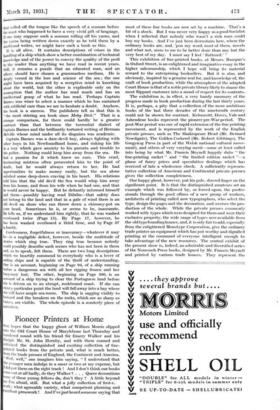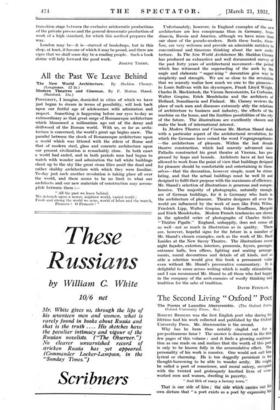Pioneer Printers at Home
OxE hopes that the happy ghost of William Morris slipped into the Old Court House of Marylebone last Thursday and wandered round with his friend Sir Emery Walker and his disciple Mr. St. John Hornby, and with them conned and criticized the distingUished and exciting collection of fine- printed books from the private and, what is much better, from the trade presses of England, the Continent and America. Well, well," one imagines him saying, " I understand that the younger men indulge in a sneer or two at my expense, but I did put them on the right track And I don't think our books me out at all badly, do they Walker ? . . . Queer decorations me of these _young fellows du, don't they ? A little beyond
I'm afraid, still. But what a jolly collection of first-1,- ork ; what agreeable variety, ,what competent- planning and xcellent presswork ! And I've just heard someone saying that most of these fine books are now set by a machine. That's a bit of a shock. But I was never very happy as a good Socialist when I reflected that nobody who wasn't a rich man could buy my books. And I've just been downstairs here, where the ordinary books are, and, 'pon my word, most of them, novels and what not, seem to me to be better done than any but the very best of my day. I must say I feel ' flattered.",' This exhibition of fine-printed books, at Messrs. Bumpus's in Oxford Street, is an enlightened and imaginative essay in the higher salesmanship, which I hope will bring its material reward to the enterprising booksellers. But it is also, and obviously, inspired by a genuine zeal for, and knowledge of, the craft of book production, while the atmosphere of the adapted. Court House is that of a noble private library likely to shame the most flippant customer into a mood of respect for its contents.
The exhibition is, in effect, a very handy summary of the progress made in book production during the last thirty years. .It is, perhaps, a pity that a collection of the more ambitious books of the last three decades of the nineteenth century could not be shown for contrast. Kelmscott, Doves, Vale and Ashendene books represent the pioneer pre-War period. The post-War period was one of rapid extension of the fine printing movement, and is represented by the work of the English private presses, such as The Shakespeare Head (Mr. Bernard Newdigate), The Golden Cockerel (Mr. Robert Gibbings), The Gregynog Press (a part of the Welsh national cultural move- ment), and others of very varying merit—some at least called into being by what Mr. Francis Meynell happily dubs " the fine-printing racket " and " the limited edition racket "—a phase of fancy prices and speculative dealings which has received of late a wholesome check. A sufficiently represen- tative collection of American and Continental private presses gives the collection completeness.
Our happy ghost, however, put his pale, shrewd finger on the significant point. It is that the distinguished amateurs set an example which was followed by, or forced upon, the profes- sionals through the good offices of a new group of workers, architects of printing called now typographers, who select the type, design the pages and the decoration, and oversee the pro- duction of the whole. While the private presses commonly worked with types which were designed for them and were their exclusive property, the wide range of types now available from the old typefounding houses, and, it is only fair to add, especially from the enlightened Monotype Corporation, give the ordinary trade printer an equipment which has put worthy and dignified printing at the command of everyone intelligent enough to take advantage of the new resources. The central exhibit of the present show is, indeed, an admirable and• diversified series of the Nonesuch Press books, designed by Mr. Francis Meynell and printed by various trade houses. They represent the transition stage between the exclusive aristocratic productions of the private presses and the general democratic production of work of a high standard, for which this method prepares the' way.
London may be—it is—starved of bookshops, but in this shop, at least, it has one of which it may be proud, and there are signs that we shall some day be a reading people. Such a book shrine will help forward the good work.
JOSEPH THORP.



















































 Previous page
Previous page